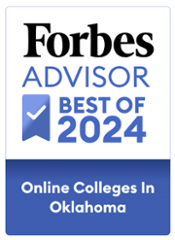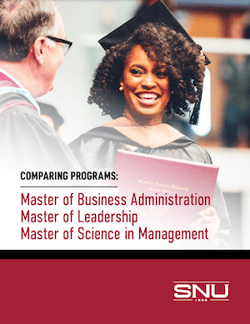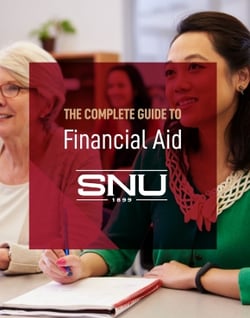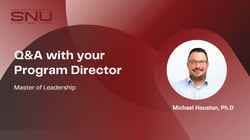-
Programs
Not Sure Where to Start?
- Associate Programs & Certificates
- General Studies
- Associate of Arts in Business
- Physical Therapist Assistant
- Professional Services & Certificates
- Special Education Bootcamp
- View All
- Undergraduate Programs
- Business Administration
- Criminal Justice
- Cybersecurity
- Education
- Family Studies and Gerontology
- Healthcare Administration
- Organizational Leadership
- Accelerated General Education
- View All
- Graduate & Doctorate Programs
- Doctorate of Education in Administration & Leadership
- M.A. Administration of Special Ed.
- M.A. Applied Psychology
- M.A. Educational Leadership
- M.A. Sports Management & Administration
- M.A. Teaching
- MBA, 12- 18 months
- MBA - Healthcare Administration
- Master of Organizational Leadership
- M.S. Counseling Psychology
- M.S. Exercise Science - Health & Human Performance
- M.S. Exercise Science - Wellness
- M.S. Instructional Design Technology
- M.S. Management
- M.S. Physician Assistant
- Alternative Certification (Teaching or Special Ed.)
- View All
- Resources
- Tuition & Aid
- Military
“Coming into this program, I thought I was culturally competent, but I quickly realized I wasn’t. Throughout the program, cultural responsiveness was woven into the courses and I found myself learning more about what I didn’t know relating to culture in each course. Now at the end of the program, I look back to how far I’ve come (and how far I still need to go) and I am grateful for this journey. I feel I am a better leader today because of this focus and I’m looking forward to sharing what I learned with my team.”
MOL Graduate
Class of 2023
Program Overview
The Master of Organizational Leadership program intentionally focuses on leadership theory and practice. The MOL program is designed to instill leadership skills in learners, enabling them to build effective, diverse teams across industries. In this program, learners explore foundational leadership principles and theories, communication strategies, conflict resolution, and ethical leadership practices, all while becoming culturally responsive leaders. The MOL program is uniquely situated in the graduate leadership landscape because it is a true scholar/practitioner program focusing on Christ-centered leadership and culturally responsive practices. With this unique program, you can earn your master’s degree and the Zig Ziglar Legacy Certificate by taking classes completely online with other driven adult students. Graduates from this program are well-versed in leadership theories, and have developed a leadership ‘tool belt’ filled with practices and approaches they can use immediately in their leadership role.
Upcoming Start Dates
Request More Info
Fill out the form below and an enrollment counselor will reach out!
Frequently Asked Questions
Earning a degree while working full time or raising a family has never been more possible. Here’s why adult students are thriving and reaching their goals at SNU:
- Classes take place entirely online.
- Students focus on one class at a time to ensure true mastery and prevent overwhelm.
- Students study alongside other adults in similar stages of life.
- Instructors with vast amounts of industry experience guide students through courses.
- Textbooks are delivered directly to your door at the beginning of each class.
- A dedicated student success advisor guides students through the duration of their studies.
While the marketplace remains competitive, the SNU MOL program is positioned uniquely to serve leaders looking for more than an ‘off the rack’ graduate program. The SNU MOL program prepares leaders to be distinctive with skills undergirded by love and servant leadership, who are culturally responsive, and able to integrate cutting-edge leadership practices while supporting and caring for those around them.
The market value of the Master of Organizational Leadership program is significant due to the increasing demand for skilled leaders across various industries. SNU's MOL program equips leaders with advanced knowledge and skills in leadership theories, strategic planning, team building, and organizational behavior, which are essential for driving organizational success. Graduates are often sought after for their ability to navigate complex business environments, manage teams effectively, and implement change initiatives. The growing emphasis on leadership development in corporate strategies highlights the relevance and value of these programs in the current job market.
- Human Resources Manager
- Management Consultant
- Health Services Manager
- Training and Development Manager
- Nonprofit Executive Director
- Organizational Development Specialist
Depending on the job and area, the average salary of a MOL graduate is $85,000-$122,000.
SNU’s Master of Organizational Leadership (MOL) program is unique due to its focus on both servant leadership development and ethical decision-making, grounded in a Christian worldview. The program offers a flexible, online format tailored to working professionals, allowing students to balance education with their careers. SNU’s curriculum emphasizes practical leadership skills in areas like team dynamics, strategic planning, and organizational change, preparing graduates for leadership roles across various industries. The program also fosters a collaborative learning environment through its cohort model, encouraging peer support and networking.
A Human Resources Manager plays a crucial role in overseeing recruitment, employee relations, and organizational development. With a focus on leadership, they design policies to improve workplace culture, manage benefits, and ensure compliance with labor laws. Graduates with a Master of Organizational Leadership from SNU are well-equipped for this role, as the program emphasizes leadership, strategic planning, and team development. This degree provides the skills needed to lead HR initiatives and support the growth of both employees and the organization.
Students progress through the MOL program in a cohort-model. The courses are lock-step, meaning they follow each other and build on each other from course 1 through course 11. The cohort model provides students extra support as cohort members get to know each other well along the graduate journey. Students report studying and working on coursework 10-20 hours per week. Each course follows a similar structure: 6 weeks, 3-5 assignments per week, and typically a one-week break in between courses.
This program costs approximately $17,325 ($525 per credit hour) + Books
SNU has a monthly Business and Leadership Network event and several other networking events throughout the year.
The Master of Organizational Leadership program at SNU intentionally focuses on leadership theory and practice. The MOL program is designed to instill leadership skills in learners, enabling them to build effective, diverse teams across industries. In this program, learners explore foundational leadership principles and theories, communication strategies, conflict resolution, and ethical leadership practices, all while becoming culturally responsive leaders. The MOL program is uniquely situated in the graduate leadership landscape because it is a true scholar/practitioner program focusing on Christ-centered leadership and culturally responsive practices. Graduates from this program are well-versed in leadership theories, and have developed a leadership ‘tool belt’ filled with practices and approaches they can use immediately in their leadership role.
Courses
The Master of Organizational Leadership program is designed to instill leadership skills in students that will enable them to build effective, diverse teams across industries. In this program, you will learn foundational leadership principles, communication strategies, conflict resolution, and more.
Credit hours: 3
This course examines the foundation of leadership based on three guiding principles: Character, Culture and Christ. Using these principles, learners are challenged to continually refine personal character, charged with creating inclusive and engaging cultures, all while modeling Christian principles of servant leadership. Learners will begin to develop a personal philosophy of leadership and understand how personal preferences influence leadership skills. Additionally, the course explores fundamental leadership theory helping to frame a personal philosophy of leadership..
Credit hours: 3
This course examines the intersection of leadership and servanthood as it relates to changing circumstances, motivating individuals, and actualizing a vision within an organization. Theoretical and experiential aspects of servant leadership are presented so that learners can understand how to apply these principles in everyday life, the work environment, and the community.
Credit hours: 3
It is critical that emerging leaders continually develop leadership skills with cross-cultural and global perspectives. This course continues to challenge learners to engage with the Taxonomy of Cultural Responsiveness, which is a perspective woven throughout the Masters program helping leaders engage in intercultural learning. Using the Christian principle of Imago Dei, learners will synthesize how the notion that all people are made in the image of the Divine Creator impacts leadership perspectives and philosophy. All people matter in the Kingdom, and it is imperative that culturally competent leaders integrate these principles into personal leadership ideology and decision-making practices.
Credit hours: 3
This course examines leadership and culture and how they influence the functioning of groups within institutions. Continuing to build with the Taxonomy of Cultural Responsiveness, the goal is to cultivate insight and respect for diversity and inclusion through the exploration of various cultures quite different from the learner’s own experience as well as develop frameworks for leading across those cultural dimensions. Strategies for effective leadership that include diversity and cultural sensitivity are emphasized.
Credit hours: 3
Strategic and focused planning efforts are a critical skill for leaders. Learners are guided through the development of a strategic plan, which is necessary for effective organizations. Learners will explore the processes needed for strategic planning, which include evaluation of previous planning models, organizational structure, needs assessment, SWOT analysis, development of objectives, allocation of resources, and an approach for administering the plan.
Credit hours: 3
This course analyzes a variety of practices essential to group dynamics in order to understand the principles, structures, and values of building and leading effective teams, involving managing different personalities, cultures, conflicting political agendas, and varying skill levels of members. Additionally, learners will explore the importance of securing resources and managing the expectations of senior executives or other stakeholders internal or external to the organization seeking collaborative relationships throughout organizations.
Credit hours: 3
Learners are presented the relationship between leadership and ethics and challenged to evaluate a leader’s role in fostering ethical behavior within the organization. Beyond examination of ethical systems and ethical issues, this course attempts to understand the ways in which ethics is central to the very act and process of leadership through an exploration of current case studies and relevant world events.
Credit hours: 3
This course examines the elements of leadership incorporating caring for others throughout the conflict resolution process. Foundational theories on conflict resolution as well as basic counseling and listening skills will be explored. Examination of how the application of these theories and skills can be utilized to resolve disputes both interpersonally and organizationally are a focus within the course. Case studies, reading materials, and simulations are utilized to create dynamic learner focused experiences.
Credit hours: 3
This course focuses on planning and implementing change within organizations and provides frameworks and tools necessary to implement that change. Examination of both personal and organizational approaches to change are utilized to analyze case studies, complete exercises, and engage in dynamic group discussions. Learners are encouraged to recognize opportunities for change in organizations and understand how to manage change when it is presented.
Credit hours: 3
People within an organization are arguably the most valuable resource, therefore, knowing how to find, lead, and motivate people is critical to the success of the leader and ultimately the organization. This course introduces techniques and skills helping leaders train, support, evaluate, and properly resource divisions or areas within organizations. Case studies are used to help the learner identify issues and opportunities for leadership to impact members of organizations. Learners will encounter challenges with budgets, personalities, and political environments within organizations and apply leadership theory and practice with the intention to improve the quality of the employees experience within the system.
Credit hours: 3
The capstone course is designed to generate and promote reflection, critical thought, intercultural responsiveness, and application of leadership knowledge and skills. Learners will develop an initiative for a real-life project related to personal, work, or community leadership that will provide the opportunity for application of effective leadership practices that balances theoretical and practical awareness of leadership principles. Discussions are utilized to engage learners and promote a more comprehensive understanding and connection of leadership skills, theories and practice to learner’s leadership settings.
Meet the Program Director
Dr. Michael Houston
Program Director
As a life-long educator, Dr. Michael L. Houston brings 25+ years of higher education experience to the Master of Organizational Leadership program at SNU. As the program developer and director, Dr. Houston seeks to help learners journey through a graduate leadership program that approaches leadership education and training differently. He believes that leadership is rooted in a love for others and that the principles of Imago Dei govern our influence and relationships with others.
Prior to coming to Southern Nazarene University, Dr. Houston served in various positions in Student Life at Azusa Pacific University, and Pepperdine University in southern California, as well as at Seattle Pacific University in Washington state. Dr. Houston is passionate about helping learners understand more about who they are, and how they may have an impactful influence on those around them.
Dr. Houston's research interests are technology, distraction, and the impacts on student learning, and innovative leadership practices. He also models healthy leadership by walking alongside his wife of 24+ years and fellow educator, Tara, as they parent their two boys, Caleb and Nathan.
Read LessAdmissions Steps
Enrolling at SNU is a simple process. With rolling start dates, there’s no need to wait months at a time to begin your educational journey. Once you have earned your bachelor’s degree from an accredited university, take the following steps:
Step 1. Apply online at degrees.snu.edu/apply
Step 2. Complete your FAFSA at fafsa.gov using school code 003149
Step 3. Send official transcripts to SNU at pgsadmissions@snu.edu or ATTN: SNU PGS Admissions, Southern Nazarene University, 6729 NW 39th Expressway, Bethany, OK 73008.
Locations
Online
Online classes are specially
designed for professional &
graduate studies.
Phone: +1 (405) 491-6332
pgs@snu.edu
Program Resources
Getting started is easy
Request more information
Ready to apply? It takes 5 minutes!
Apply NowApplication Requirements
- Meet the admission requirements for your specific program
- Apply for an Undergraduate or Graduate Program
- Submit transcripts
- Be admitted, get advised, and enroll

Text With an Enrollment Counselor
Take your first step toward becoming an organizational leader by texting with an enrollment counselor today about your future.








.png?width=200&height=220&name=2024_OnlineU_Best_Colleges_Badge%20(1).png)


%20(1).jpg?width=250&height=324&name=EB-SNU-WhattoExpectfromanOnlineDegreeProgram%20(1)%20(1).jpg)




